by Chuck and Bonnie Milliken | Mar 30, 2017 | SAMS Missionaries, South East Asia, Thailand
Very early last Thursday morning we flew to Siem Reip, Cambodia, because we needed to be out of country in order to re-start our 30-day limit without buying a visa. We were happy to do this as it gave us an opportunity to visit Angkor Wat, one of the major tourist destinations in the world. It was very interesting and we wandered around there for nearly four hours despite the hot sun. I’ll leave it to you to look up the history for this place as it is a lot to write here. After this most famous temple, we also visited Ta Prohm, the temple where Tomb Raider was partially filmed. Then on to Bayon and on to see the sunset (which we didn’t actually do) at another temple high on a hill. I forget the name of that one. I didn’t make it all the way to the top of the hill and turned back although Chuck, as always, charged on. When he came down he told me I was actually almost there when I turned back. I was just SO hot that climbing was not at all fun. He took some nice photos there, but unfortunately, my card reader for my old camera which he was using will no longer work and we couldn’t find one here. But there are plenty of pictures from my camera to share. In addition to the temples we visited, there were many that we passed that were not open to tourists. I had no idea it was such a large area.

Our transportation and driver for our three days in Cambodia–tuk tuk and driver, Saar-rot (I’m just guessing at how to spell his name)

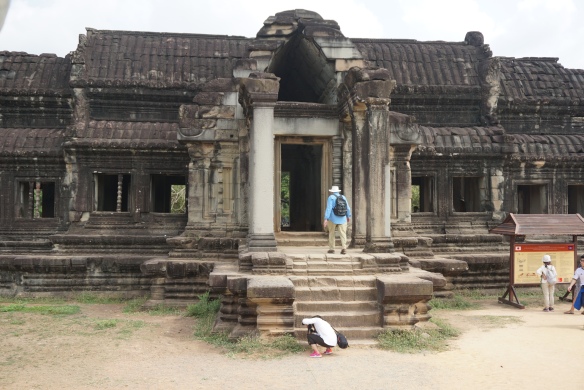






Love those stairs—there were many

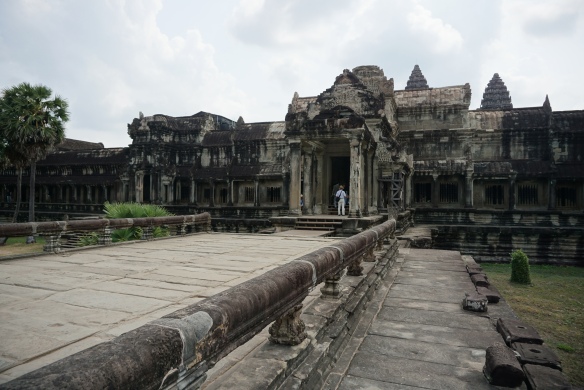
The following five pictures are at TaProhm
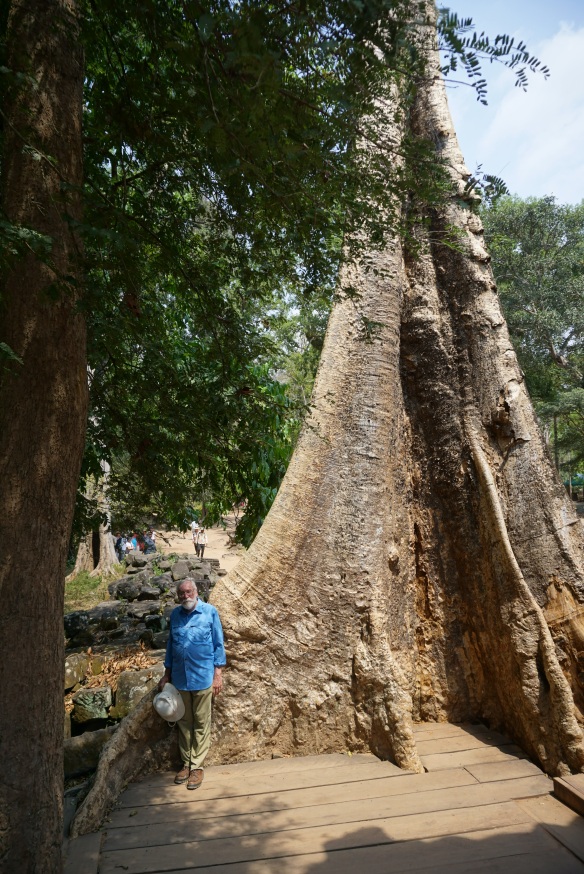




TaProhun
The next three are from Bayon temple.we”””””””””””””””””””””””””””””””””””””””””””””””””””””””””””””””””””””””””””””””””””””””””””””””””””””””””””””””””””””””””””””””””””””””’eeeeeeeeeeeeee””””””””’

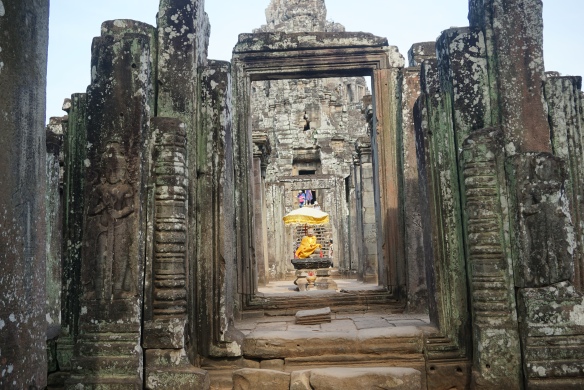


Chuck looks at a memorial to The Killing Fields–many died here in Cambodia.

At the Angor National Museum, Siem Reip, Cambodia
That’s it for today!
by Chuck and Bonnie Milliken | Mar 30, 2017 | SAMS Missionaries, South East Asia, Thailand
I am here in the Student Center waiting for my laundry to be done and it is time for another post. Tomorrow Chuck and I will make a long trek to the ruins of the old capital, the ancient city of Ayutthaya (a-Yoot-ta-ya) and I realized I haven’t even sent pictures of the temples we have visited so far. By the way, What’s a Wat? —a Buddhist temple.
Two weeks ago on Saturday we took the old train which runs close by downtown to see what we could see. It was certainly no luxury train. We had to walk a mile to board, the seats were old and hard and it had no air conditioning. But it did have fans and was right on time and the price was right—-free on the way down and 18 cents each on the way back. The day was incredibly hot and we did not see all we had hoped to see but it was a good day of sight-seeing nonetheless.

The OLD train. They have newer trains, of course. When we go to Ayutthaya we’ll take this train downtown, then catch a similar train there. Total travel time 2 1/2 to 3 hours.

Wat Tramit

An outdoor shrine near the wat

A new monk praying


The world’s largest solid 18 carat gold Buddha weighing 5 tons
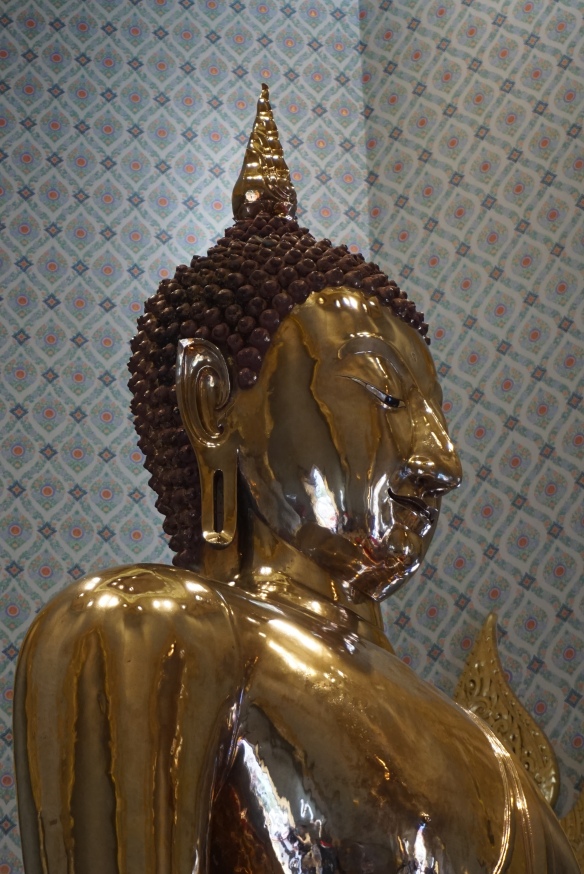
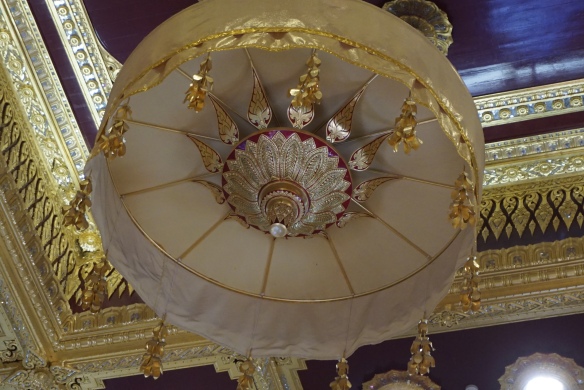
Chandelier over the Buddha

Another small Wat we visited

We saw this procession of the family and friends and a new monk heading for an installation ceremony. Most monks, we are told, are only monks for a short period–anywhere from 3 months to 3 weeks. However, some will go for much longer periods including some who are monks for life. There are hundreds of rules they must observe and whatever else they do, they survive by highly-ritualized begging. Buddhists believe that in order to be reincarnated to a better life next time they gain merit- the more, the better. Giving gifts to a monk gains merit. Becoming a monk gains merit and this is traditionally dedicated to his mother for her benefit. This is an important act of filial devotion. When we return, we’ll have more to say about this in our presentations.


This picture, and the following ones are from our visit to Wat Pho which was an amazing place. It was hard to photograph because the sun was SO bright, I couldn’t see what I was taking sometimes which means I sometimes missed the tops of some things.

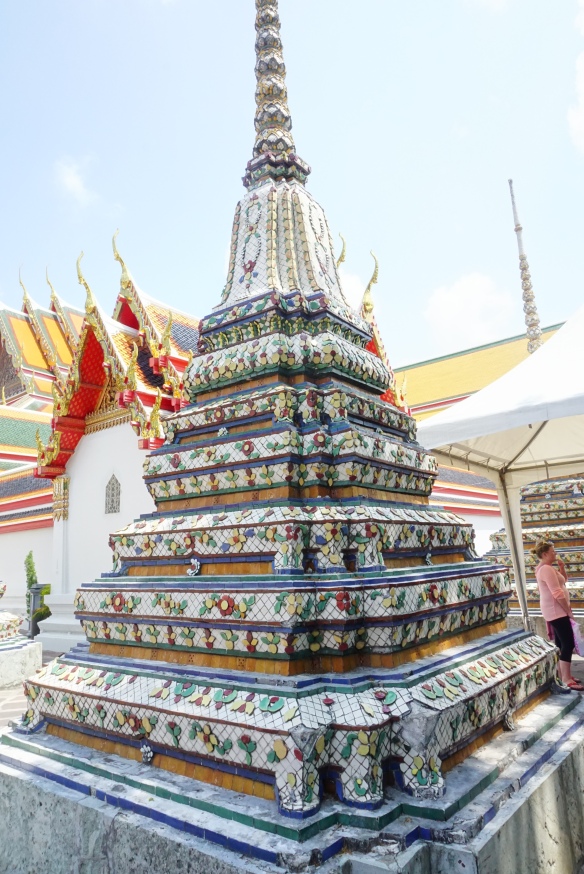



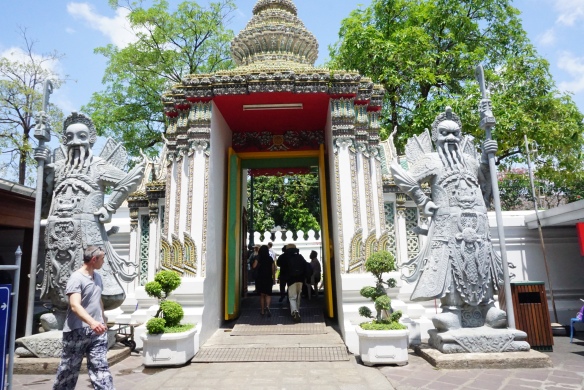

The reclining Buddha at Wat Pho. He is half a football field long.


Here people can gain merit by purchasing these coins and then depositing them in the monk’s bowls pictured below.



If anyone is improperly dressed–shorts, uncovered shoulders, etc.–they must wear one of these coats.

At first I thought this was funny but, after consideration, I think it is good advice to beware of your valuable possessions.


The last thing we did was climb the Golden Mount for a great view of the massive city of Bangkok.


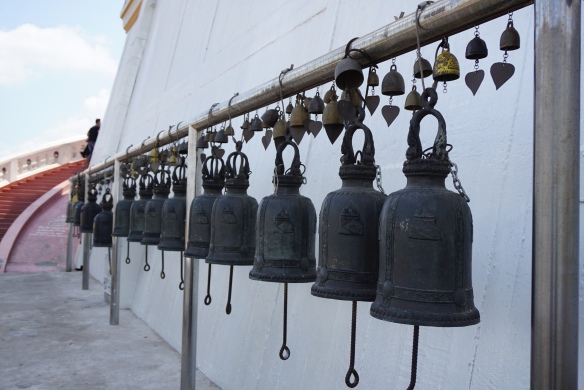

Here we are at the top!
by Chuck and Bonnie Milliken | Mar 29, 2017 | SAMS Missionaries, South East Asia, Thailand
There is so much I’d like to share but the time to post is sometimes hard to find. In order to attach pictures I have to go over to the Student Center because the connection here in our room is not good enough. We try to do some things in the mornings and then our work stint from 2 to 10 pm leaves us feeling less than energetic so it is easy to put off writing a post. Right now, we are waiting to meet with a couple of students who want to take us to a park this morning. So I thought I’d start a post and then add the photos later.

This picture–the outside steps to the student center last night–shows that we had a nice crowd of students. Since many places we go here require that we remove our shoes to keep the inside clean, this is a familiar scene. Needless to say, we feel a bit odd going into a restaurant or store (not too many of them require it) in our bare feet. In the US, of course, it is “No shoes, no service” here it is the opposite. One of our first days here, I was wearing a pair of sandals with an elastic strap around the back. Coming out of the store, I found I could not put them on without sitting down so had to walk the block and a half home barefoot carrying my sandals. So now I’m careful what I wear although when walking a lot for sightseeing, I do have to have my supportive Eccos. So far, I’ve been able to put them back on. At temples they usually provide a bench to sit on to do this. Around here, most wear Crocs-type shoes and flip flops.
Yesterday morning we took a cab downtown at 6:30 a.m. hoping to see a few more sights. Because the traffic was so extremely heavy and slow, we didn’t get to see much and one destination was closed for repairs so, by the time we got back at 2 p.m. (in time for class) we had spent 2 hrs. actually seeing things and the rest of the time riding in a cab and sitting in traffic jams. We visited a Hindu temple where, unfortunately, I was not allowed to take photos. It was very interesting and different. I was able to capture some of it from the outside.



This young woman is stringing flowers into a sort of lei which people buy to put on their altars to their various gods.
Second, we visited the Royal Barge Museum. On significant occasions, these barges parade down the river with the king and other notables. Wish we could have seen that. Our final stop was the Jim Thompson house. He was an American who lived in Bangkok and was the promoter of the cottage industry of the hand weaving of Thai silk. He was an architect and his home, made entirely of teak, is unusual and full of many interesting objects. Again–no photos inside.
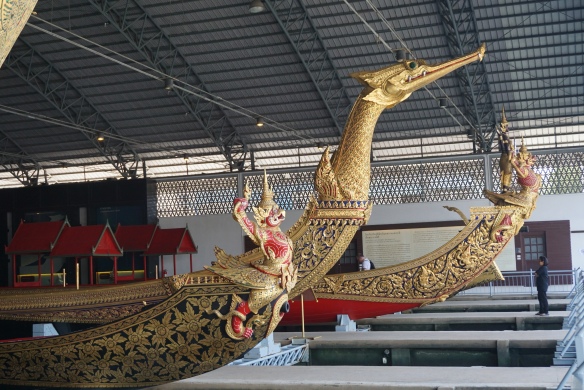

While in Cambodia, besides the well-known temples, we visited a silk farm where we got to see the production of silk from the moths to the finished product. All of this is very labor intensive and explains why even a silk scarf is so expensive.

Silk worms eating their mulberry leaves


Steps in the production of silk fabric
Chuck had a skin problem with his feet when we arrived and we had to visit a hospital to see a dermatologist. That was quite an experience as the hospital was unlike any we’ve seen before. First, it was beautifully landscaped including a fountain. We were met at the door by two doormen who opened the cab doors for us and the doors to the hospital. Inside we were greeted by two lovely young women who directed us to the correct area for his appointment. There was a grand piano playing in the large lobby. Making our way to the elevator, we passed Starbucks, Dunkin’ Donuts, and other emporiums as well as a beauty salon. Check out these pictures.

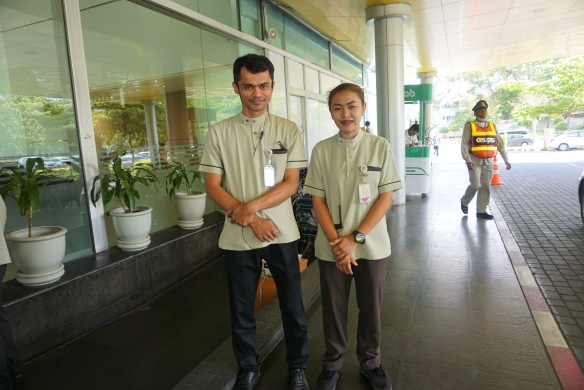
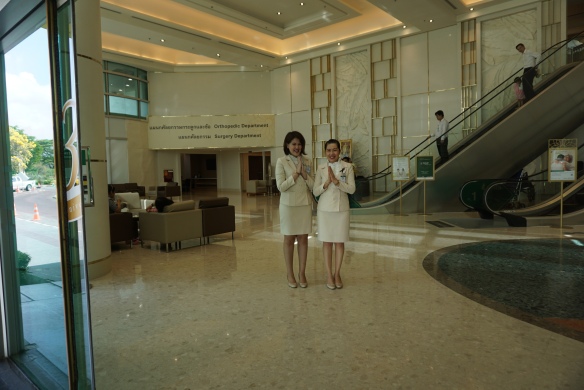
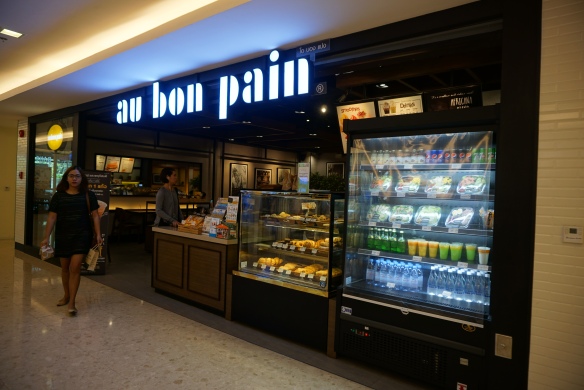
Sa Wat Dee Ka, Bonnie
by Nate and Erika Twichell | Mar 27, 2017 | Gap Year, SAMS Missionaries, USA
We were sitting in Lucy and David’s apartment in Falls Church, VA for a little under a half an hour before Lucy begun to share with us their profound story of trusting our faithful God. During their time in Kenya, David and Lucy had seen the unexpected ways God provided for their family and their ministry. They had worked with the local church to provide leadership and discipleship training to local youth. Whether that provision be finances, participants, or a specific need, God had been present in their lives and provision. Lucy repeated over and over again, “God does not disappoint”.
God does not disappoint (think Romans 5:1-5). Nate and I wrestled with that promise most of the way home. We’d cut our trip short due to an impending snow storm (getting snowed in away from home with Henry and Annie didn’t seem like the best idea for everyone’s well being) and were struggling to not feel discouraged. God does not disappoint. At times, we’d rather have the promise “God blesses your plans” or “God won’t let you fail” or “God will make all your dreams come true”, or at the very least “God will help your toddler sleep in the car”. But instead, God comes to us in the cruciform body of Jesus Christ and proclaims He does not disappoint. He gives us grace for today. And, will extend that same grace tomorrow, but asks us to trust Him today. It is hard to abide in that place of trust, but it is indeed the safest place to rest.
We know that all of our striving and preparation will not amount to anything without God’s provision. We need Him to move in a mighty way. Can you join us in praying and fasting for students and provision? The members of our oversight board, some of our supporters, and the missions committee of our sending church have committed to fast and pray for us on March 28th. Can you fast a meal, or spend your coffee time in prayer? Our greatest needs are for students and financial support. We have so many of the components of Agape Year in place. We don’t have students. Can you pray with us?
Thanks!
Erika, Nate, Henry, and Anne
by Chuck and Bonnie Milliken | Mar 26, 2017 | SAMS Missionaries, South East Asia, Thailand
One of the distinctive features Bonnie and I notice wherever we travel is the influence of religious beliefs and practices on the architecture and adornments of the society. It doesn’t take a genius to figure out whether you’re in a Christian, Muslim, or some other type of society. Thailand, for instance, represents a religious blend of Buddhism, Hinduism, and animism. Of course, explicitly religious buildings reflect these various influences but what I’m referring to here is not only temples, mosques, churches, etc. Representations of Buddha and many Hindu gods and goddesses may be found outside temple precincts. Animism, however, at least as far as we can tell, is not represented by dedicated buildings as it by ghost houses found near many homes, apartments, and businesses.
Animism is a belief, and it is a very ancient one, that inanimate objects are imbued with some sort of soul or spirit and, therefore, have the power to harm or bless those who treat these spirits either neglectfully or reverently. As an example, one must not step on the threshold of a house because the spirit of the house is thought to reside there and to step on that spirit with the very shameful and disgusting bottom of one’s foot is not to be done. For the culturally unaware sometimes signs are posted reminding you of this taboo. Aside from the spirit of the threshold, many other spirits are found in and around the house, building, business or whatever. Spirits, like anyone else, need a place to live and one suspects that a preferred option is to have them live at a respectful distance outside the house. Hence, the very common presence of ghost houses. Here are a few examples:
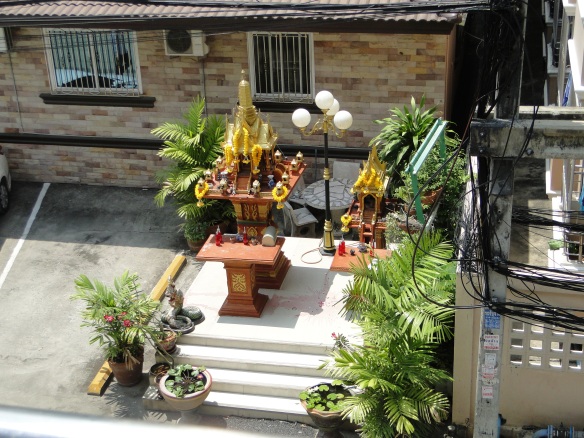
This one is directly behind us–the view from our balcony.

Note the offerings of soft drinks with straws.

As these pictures show, various offerings of drink, incense, and other gifts are presented to the spirits to solicit their good will.
Naturally, the degrees of piety and wealth suggest greater or lesser ghost houses. On one of my morning walks I encountered a rare rainfall and sought shelter in the nearest open building which turned out to be a large ghost house dealership. Below are a few of the offerings ranging in price from 300 dollars to 30,000 dollars US.
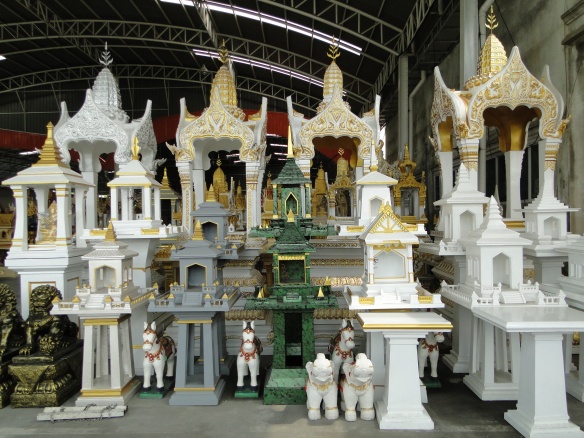
Some available ghost houses–there were many hundreds for sale in this store.
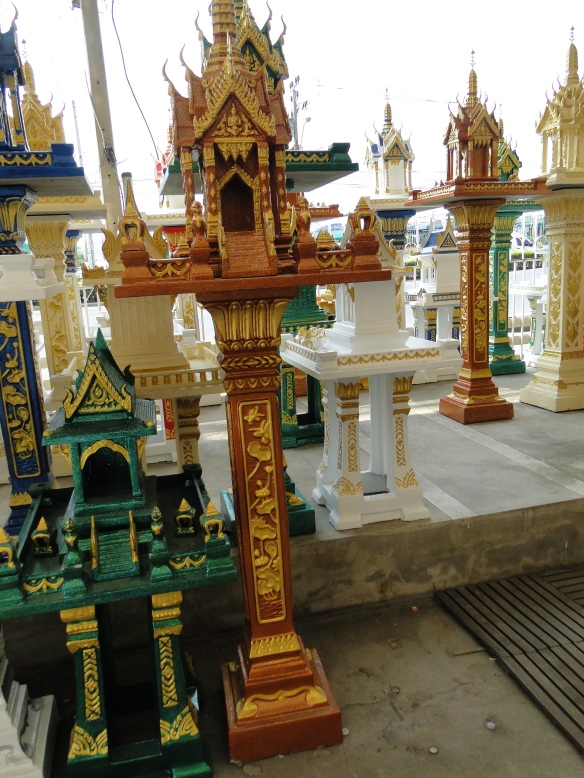
Modestly priced models–perhaps $300 to $1,000

Top of the line–$30,000 model.
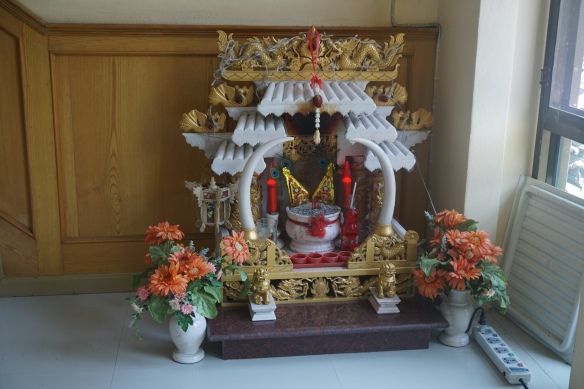
This ghost house is on the first floor of the Sangwattana Mansion, the dorm where we live. It is a Chinese derivation and has a different look including flashing electric lights, like those on a Christmas tree.
It is difficult to say precisely what an individual Thai might believe. As I mentioned, many beliefs are found intermingled. There is a significant Muslim minority and a quite modest (perhaps one percent or so) presence of Christianity.
Sa Wat Dee Krop, Chuck








































































